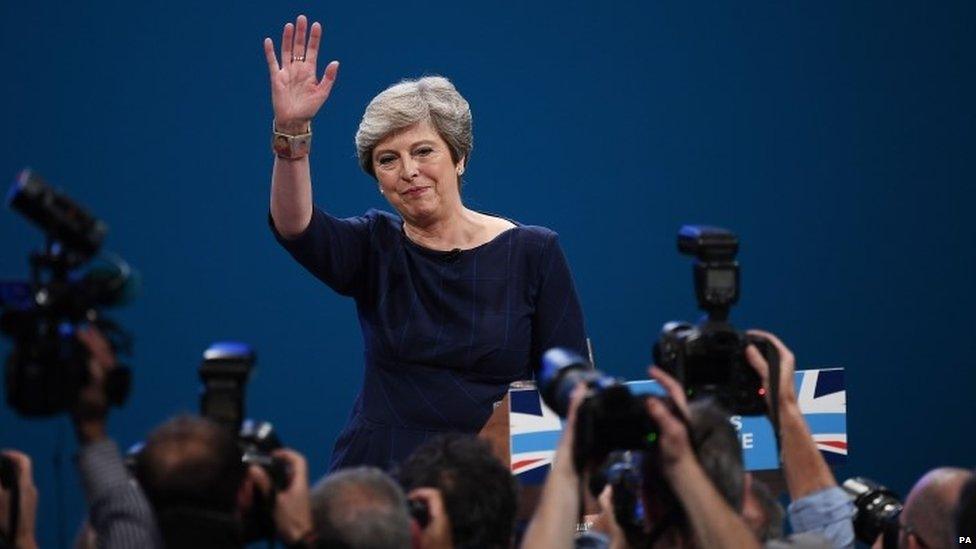Theresa May announces £2bn for council homes expansion
- Published
- comments
Theresa May offers a "new generation of council houses"
Councils and housing associations have welcomed government plans to spend £2bn on a "new generation" of council houses and affordable homes for rent.
In her conference speech, Theresa May pledged to dedicate her premiership to fixing the "broken" housing market.
The state, she said, must get "back in the business" of building subsidised rented homes for those not able to buy.
Labour and housing charities said the plan would only help a fraction of the 1.2 million families awaiting housing.
The government said the £2bn injection could fund 25,000 homes for social rent by 2021 although the National Housing Federation said the figure could rise to between 50,000 and 60,000 if the government's intervention unlocked, as it is hoped, a further £3bn in public and private investment.
In 2015-6, 6,800 social rented homes were completed.
Speaking in Manchester, the prime minister - who was interrupted by a prankster and battled with a persistent cough during a troubled speech - said the UK's housing market was "broken", with falling levels of home ownership, demand outstripping supply and the high cost of renting in the private sector shutting millions of people out.
Promising to "take personal charge" of "getting government back into the business of building houses", she told builders to "do your duty to Britain and build the homes our country needs".
"So whether you're trying to buy your own, renting privately and looking for more security, or have been waiting for years on a council list, help is on its way," she said.
The government said the £2bn it was making available would unlock a further £3bn in public and private investment in all types of housing.
In areas of the country where rents were high, the focus will be on increasing the supply of social housing - where rents are set at a typical discount of 30% to 40% to the market rate.

Mrs May's speech was dominated by a series of unforeseen events
The policy marks a departure from that of the Conservative-Lib Dem coalition which focused on "affordable" homes for rent, where tenants paid higher rents of up to 80% of the market value.
David Orr, from the National Housing Federation, said it marked the first injection of funding into the social rented sector since 2010 and marked a move away from a sole focus on increasing owner-occupation.
"It will make a big difference," he told BBC News.
However, he said the success of the scheme would depend on increasing availability of public land. "It is really important that the government accepts that it has a critical role to play," he added.
Shelter's Polly Neate welcomed the shift in emphasis to affordable renting but said £2bn would not go a long way to helping the 1.2 million families in England waiting for a council house - a statistic she said represented "an enormous amount of human suffering".
Labour said the number of new houses being proposed was "paltry" and it had pledged at the election to build more than 60,000 social homes for rent within two years.
'Renaissance'
The Local Government Association, which represents more than 300 councils in England and Wales, said it hoped it marked a "significant shift" in the government's housing policy.
While it did not expect a return to the late 1970s, when councils built more than 40% of new homes, it said local authorities wanted to "get on with the job" of building, particularly in areas of real need.
"It is good the government has accepted our argument that councils must be part of the solution to our chronic housing shortage and able to resume their historic role as a major builder of affordable homes," its chairman Lord Porter said.
"Councils are working with communities to approve nine in 10 planning applications but it is clear that only an increase of all types of housing - including those for affordable or social rent - will solve the housing crisis."
However, the LGA reiterated its call for restrictions on councils being able to borrow to spend on building new homes to be lifted.
The Institute for Economic Affairs said the UK already had more social housing stock than France, Spain and Germany and the highest number of tenants living in subsidised rental properties.
The free market think tank said the government needed to focus on removing supply-side obstacles to house building, such as unnecessary and onerous planning regulations.
- Published4 October 2017
